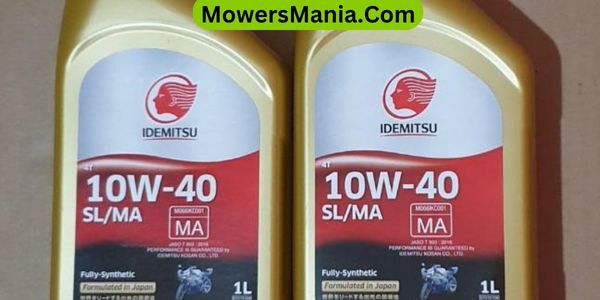Thinking of using 10W-40 oil in your lawn mower? You’re not alone. Many people wonder about this, given its popularity in automotive engines.
But before you make the switch, it’s essential to understand the potential effects and compatibility with your lawn mower.

Understanding 10W-40 Oil
You can use 10W-40 oil in your lawn mower if the manufacturer recommends it for your specific model. Understanding 10W-40 oil is crucial for maintaining your lawn mower. The numbers 10W-40 refer to the oil’s viscosity, which is its thickness or resistance to flow.
The ’10W’ indicates the oil’s viscosity in cold temperatures, with the lower the number, the better it flows when cold. The ’40’ represents the oil’s viscosity at high temperatures.
This means that 10W-40 oil is suitable for both cold starts and hot operating conditions, making it versatile for various lawn mower models.
When choosing oil for your lawn mower, it’s essential to select one that matches the manufacturer’s recommendations to ensure optimal performance and longevity.
Using the wrong oil viscosity can lead to poor lubrication, increased engine wear, and reduced overall efficiency.
10W-40 oil provides a balance between cold-start protection and high-temperature lubrication, making it a suitable choice for many lawn mower engines.
Always consult your lawn mower’s manual or the manufacturer’s guidelines to determine the correct oil viscosity for your specific model. Adhering to these recommendations will help keep your lawn mower running smoothly and extend its lifespan.
Compatibility With Lawn Mower Engines
When considering the compatibility of 10W-40 oil with lawn mower engines, it’s important to understand the specific requirements of your mower’s engine. Using the wrong oil can lead to engine damage and decreased performance.
Here are some factors to consider:
- Viscosity: Check the owner’s manual to ensure that 10W-40 oil is within the recommended viscosity range for your lawn mower engine.
- Additives: Some lawn mower engines may require specific additives in the oil for optimal performance and longevity.
- Temperature: Consider the climate and operating conditions in which your lawn mower will be used. 10W-40 oil may not be suitable for extreme temperatures.
- Manufacturer Recommendations: Always follow the manufacturer’s recommendations for oil type and viscosity to ensure compatibility and maintain warranty coverage.
- Oil Change Frequency: Consider how frequently you’re willing to change the oil. Some oils, including 10W-40, may require more frequent changes compared to other viscosities.
Understanding these factors will help you determine if 10W-40 oil is compatible with your lawn mower engine and whether it will provide the necessary protection and performance.
Potential Benefits of 10W-40 Oil
Using 10W-40 oil in your lawn mower can provide improved lubrication and protection for your engine. The 10W-40 oil is designed to flow well at low temperatures, providing easier starts during cold weather.
This means less wear and tear on your engine during those crucial start-up moments. Additionally, the 10W-40 oil maintains its viscosity at high temperatures, ensuring that your engine stays properly lubricated even during the hottest summer days.
This stability in viscosity helps to reduce friction and wear on engine parts, leading to a potentially longer engine life.
Another benefit of using 10W-40 oil is its versatility. It can be used in both air-cooled and water-cooled engines, making it suitable for a wide range of lawn mower models.
This can simplify the maintenance process by allowing you to use the same type of oil for multiple outdoor power equipment.
Furthermore, 10W-40 oil contains additives that help to clean the engine and minimize the formation of harmful deposits. This can contribute to a cleaner-running engine with improved overall performance.
Drawbacks and Risks to Consider

Before using 10W-40 oil in your lawn mower, consider the potential risk of increased oil consumption. Using a heavier oil such as 10W-40 in your lawn mower may lead to certain drawbacks and risks that you should take into account.
Here are some important points to consider:
- Higher Oil Consumption: 10W-40 oil, being heavier, may result in increased oil consumption by your lawn mower engine. This means you may need to top up the oil more frequently, leading to higher maintenance costs.
- Potential Engine Strain: The heavier viscosity of 10W-40 oil may cause added strain on the engine components, potentially affecting the overall performance and longevity of your lawn mower.
- Heat Dissipation: Thicker oil may not dissipate heat as effectively as lighter oils, which could lead to overheating issues, especially in warmer climates or during extended use.
- Manufacturer Recommendations: Using a different oil viscosity than what the manufacturer recommends may void the warranty on your lawn mower, leaving you responsible for any future repairs or replacements.
- Environmental Impact: Heavier oil may result in increased emissions, contributing to environmental pollution. Consider the environmental impact before making the switch to 10W-40 oil in your lawn mower.
Manufacturer Recommendations and Guidelines
When it comes to using oil in your lawn mower, it’s essential to follow the manufacturer’s recommendations and guidelines.
Consider the specific design of your mower’s engine and whether it’s compatible with the 10W-40 oil.
Checking for oil compatibility is crucial to ensure optimal performance and longevity of your lawn mower.
Follow Manufacturer’s Oil Specifications
Make sure to always use the type of oil recommended by the lawn mower manufacturer for optimal performance and longevity. Using the right oil is crucial for maintaining your lawn mower.
Here are some reasons why you should adhere to the manufacturer’s oil specifications:
- Optimal Lubrication: The recommended oil type ensures proper lubrication for all the moving parts in the engine.
- Engine Cooling: Using the specified oil helps in maintaining the right operating temperature for the engine.
- Preventing Buildup: The recommended oil minimizes the risk of sludge and deposit formation, keeping the engine clean.
- Warranty Compliance: It’s essential to follow the manufacturer’s guidelines to maintain the warranty validity.
- Performance and Longevity: Using the correct oil type can significantly impact the overall performance and lifespan of your lawn mower.
Consider Mower’s Engine Design
To ensure optimal performance and longevity, always consider the manufacturer’s recommendations and guidelines for your mower’s engine design when selecting the appropriate oil.
Each mower’s engine design is unique, and using the recommended oil weight and type is crucial for proper lubrication and functioning. Manufacturers often provide specific oil viscosity and quality requirements tailored to their engine designs.
Some engines may require 10W-30 oil, while others may specify 10W-40. Ignoring these guidelines can lead to inefficient lubrication, increased wear and tear, and potential damage to the engine. Additionally, some manufacturers may void the warranty if the specified oil recommendations aren’t followed.
Therefore, it’s essential to adhere to the manufacturer’s guidelines to ensure the best performance and longevity for your mower’s engine.
Check for Oil Compatibility
After considering your mower’s engine design, it’s important to check for oil compatibility according to the manufacturer’s recommendations and guidelines. Using the wrong type of oil can lead to engine damage and void the warranty.
To ensure you’re using the correct oil for your lawn mower, follow these steps:
- Consult the owner’s manual for specific oil recommendations.
- Look for the API (American Petroleum Institute) certification label on the oil.
- Check for any additional manufacturer guidelines or specifications.
- Consider the temperature range in which your mower operates and select the appropriate oil viscosity.
- When in doubt, contact the manufacturer or a certified dealer for oil recommendations.
Best Practices for Choosing Lawn Mower Oil

When choosing oil for your lawn mower, it’s important to consider the viscosity compatibility. Whether you opt for synthetic or conventional oil is another factor to consider.
Additionally, the recommended frequency for oil changes should be taken into account. These factors can significantly impact the performance and longevity of your lawn mower, so it’s essential to make informed decisions.
Understanding these best practices will help you keep your lawn mower running smoothly and efficiently.
Oil Viscosity Compatibility
You should consider viscosity when selecting the best oil for your lawn mower. The viscosity of the oil determines its flow and resistance to flow, which is crucial for proper lubrication in the engine.
Here are some best practices for choosing lawn mower oil:
- Check the Manual: Refer to your lawn mower’s manual to find the recommended oil viscosity for your specific model.
- Consider Temperature: Choose oil viscosity based on the temperature range in which your lawn mower operates.
- Single Grade vs. Multi-Grade: Understand the difference between single grade (e.g., SAE 30) and multi-grade (e.g., 10W-30) oils and their suitability for your lawn mower.
- Avoid Higher Viscosity: Avoid using oil with a higher viscosity than recommended, as it can lead to engine damage.
- Regular Checks: Monitor oil levels and viscosity regularly to ensure optimal engine performance.
Synthetic Vs. Conventional Oil
Consider using a synthetic oil if you desire enhanced performance and longer intervals between oil changes for your lawn mower.
Synthetic oils are chemically engineered to provide superior lubrication, reduce friction, and withstand high temperatures, making them ideal for high-performance engines.
They also offer better protection against wear and tear, especially in extreme weather conditions.
On the other hand, conventional oils are derived from crude oil and are generally more affordable. However, they may require more frequent oil changes and offer less resistance to breakdown under high temperatures.
When choosing between synthetic and conventional oil for your lawn mower, consider your usage patterns, climate, and budget.
Ultimately, synthetic oil may be a worthwhile investment for those seeking optimal engine protection and extended maintenance intervals.
Oil Change Frequency
To maintain optimal engine performance and longevity, it’s important to adhere to the recommended oil change frequency for your lawn mower.
Here are some best practices for choosing lawn mower oil change frequency:
- Follow the manufacturer’s guidelines: Check your lawn mower’s manual for the recommended oil change intervals.
- Consider usage frequency: If you use your lawn mower frequently or in challenging conditions, more frequent oil changes may be necessary.
- Monitor oil quality: Regularly check the oil for discoloration or debris, and change it if it appears dirty or contaminated.
- Use high-quality oil: Investing in a high-quality oil can contribute to better engine performance and may allow for longer intervals between changes.
- Consult a professional: If in doubt, seek advice from a professional or your local lawn mower service center.
Frequently Asked Questions [FAQs]
Can Using 10W-40 Oil in My Lawn Mower Void the Manufacturer’s Warranty?
Using 10W-40 oil in your lawn mower may void the manufacturer’s warranty. Always check the owner’s manual for the recommended oil type and viscosity to ensure proper functioning and warranty coverage.
Will Using 10W-40 Oil Cause Any Damage to My Lawn Mower Engine?
Using 10W-40 oil in your lawn mower can lead to engine damage. The oil may not provide sufficient lubrication, leading to wear and tear. Stick to the manufacturer’s recommended oil to ensure optimal engine performance and longevity.
Is It Necessary to Use a Specific Type of 10W-40 Oil for My Lawn Mower, or Are All 10W-40 Oils the Same?
You should use a specific type of 10W-40 oil for your lawn mower. Not all 10W-40 oils are the same, and using the wrong one could cause damage to your mower’s engine. Always check your manufacturer’s recommendations.
Are There Any Specific Maintenance or Care Requirements When Using 10W-40 Oil in a Lawn Mower?
When using 10W-40 oil in your lawn mower, ensure proper oil level, change as recommended, and check for leaks. Regular maintenance like air filter and spark plug checks are important. Always follow the manufacturer’s guidelines for best results.
Can Using 10W-40 Oil Improve the Performance or Lifespan of My Lawn Mower?
Using 10W-40 oil can improve your lawn mower’s performance and lifespan. It provides better protection in high temperatures, reduces friction, and offers enhanced engine cleanliness. Regular oil changes with the recommended grade are crucial for optimal mower maintenance.
Conclusion
So, can you use 10W-40 oil in your lawn mower?
The answer is yes, but with caution. While it may be compatible with some engines and offer benefits such as better lubrication and protection, there are also potential drawbacks and risks to consider.
Always check your mower’s manufacturer recommendations and guidelines, and follow best practices for choosing the right oil to ensure optimal performance and longevity for your lawn mower.



